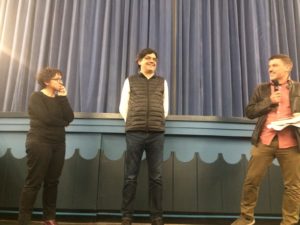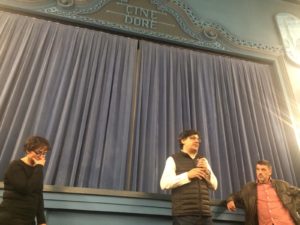
The two exiles
Organizado por la Filmoteca Española
‘The two exiles’ explores the vestiges of republican cinema after spanish Civil War. The season, organized by the Spanish Filmotec, is curated by José Luis Castro de Paz, member of the Audiovisual Research Group, together with Josetxo Cerdán and Miguel Fernández-Rodríguez Labayen. The projections take place at Doré cinema during April and May, gathering, for the first time and from a wide perspective, the intern and external exiles in the cinematographic production which goes from the end of the armed conflict until the dictator’s death.
After the Spanish Civil War, the fertile republican forms of the film culture found ways of subsistence both outside and inside the country. This hypothesis -the presence of an essential republican, national-popular footprint in Spanish cinema even since the first Francoism- along with university research and the commemoration of the 80th anniversary of Civil War conclusion, supports ‘The Two Exiles’. The program is included in the research project Cartographies of Mobility Cinema in the Hispanic Atlantic, funded by the Ministry of Economy and Competitiveness and co-financed with FEDER funds.
The films
Among the 22 selected films, the curators remark the monumental ‘Sierra de Teruel’ (André Malraux, 1939), promoted by the republican government but released abroad, and the Hispanic-Mexican ‘En el balcón vacío’ (Jomí Garci’a Ascot, 1962) , a filmic experience constructed from painful fragmentary memories, financed and directed by exiled Spaniards.
There will also be titles of filmmakers, scriptwriters, performers and producers in exile, such as Luis Buñuel and Luis Alcoriza (‘La hija del engaño’, 1951); Carlos Velo (‘Torero’, 1956); Angelillo (‘Mi cielo de Andalucía’, Ricardo Urgoiti, 1942); Miguel de Molina (‘Esta es mi vida’, Ramón Viñoly Barreto, 1953); María Casares (voiceover of ‘Guernica’, Alain Resnais and Robert Hessens, 1950); Jacinto Esteva (‘Notes Sur l’émigration’, 1962), Fernando Arrabal (‘Viva la muerte’, 1971) or Jorge Semprún (‘Les deux mémoires’, 1973).
Likewise, the selection includes films that show the ways filmmakers who remained in Spanish territory tried to refer to their connections with the Second Republic, metaphorically or discreetly, as well as to the “inner exile” they suffered. In this way, we will find an heterogeneous sample with works of the new generation formed in the 30’s (Antonio Román, Carlos Serrano de Osma, Arturo Ruíz Castillo), of the ‘regenerationists’ of the 50’s (‘El malvado Carabel’, Fernando Fernán-Gómez, 1955), of the New Spanish Cinema (‘Nueve cartas a Berta’, Basilio Martín Patino, 1962); and of internal exiles (‘El espíritu de la colmena’, Víctor Erice, 1973).

01/04/2019Cine Doré





